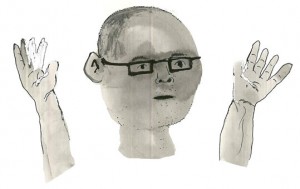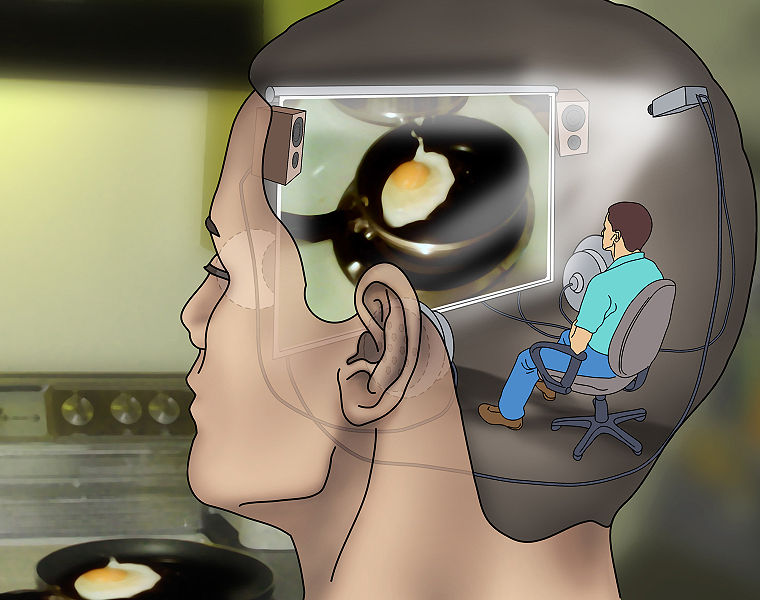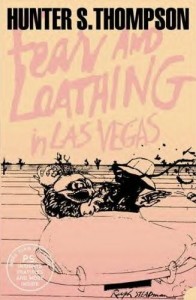Harmony Korine is very adorable while on drugs
httpv://www.youtube.com/watch?v=i7nrhGQteas&feature=related
I read A Crackup at the Race Riots a couple months ago, after Kevin Sampsell recommended it to me, and I thought it was pretty okay. Harmony calls it a novel but it’s more like typed-up excerpts from a journal, half-funny jokes about celebrities, a few pages like the ‘hepburn’ one that letterman mentioned, and some drawn-on photos.
I mean, I like it. It’s great. I bought it for thirty dollars, I think.
That’s a lot for a paperback. Plus shipping.
I keep it on the part of my bookshelf with all the books I really like. But I don’t open it as often as I open other books.
Here is something Harmony said in an interview:
A bouncer at a strip-club was standing next to a stripper with a balloon. I popped the balloon and he flipped out. So I started provoking the guy. He smashed me in the face, so I picked up a trashcan and went to throw it at his head, but it was chained to a light-post.
Literary Doppelgangers: Quartet
MICHEL FOUCAULT & CHRISTOPHER LLOYD


Michel Foucault tells us of The Order of Things, which is pretty simple: Back to the Future, Back to the Future II, and Back to the Future III. Jeez, that was easy. Call me a philistine, but I’ll pick those movies any day over freakin’ semiotics. Up until this post, I thought that photo of Lloyd was a Ron Mueck sculpture. In the age of mimesis, everything is suspect.
It’s the end of the world as we know it, and I used to feel fine

R.E.M frontman Michael Stipe seems keen on auditioning as the fourth member of the Blue Man Group. Tibet is nice and all, but Michael, you’re making people suffer here. Why is it that artists so ‘mature’ in their youth can be so ‘immature’ in their elder years? I use quotes around those words because I don’t fully subscribe to such simple dichotomies, though I do often wonder — what the fuck happens? Is fame that bad?
Literary Doppelgangers: Jonathan Safran Foer and Brian Chase


James Scott points out this doppelganger: Jonathan Safran Foer and Brian Chase, drummer for the Yeah Yeah Yeahs.
What do you think?
Seems like there’s a missing mole in there somewhere.
Jimmy Chen Month at HTMLGIANT
 Not to be outdone by Writers’ Bloc, which has declared this week to be Jimmy Chen Week, we’ve declared the month of May to be Jimmy Chen Month here at HTMLGIANT.
Not to be outdone by Writers’ Bloc, which has declared this week to be Jimmy Chen Week, we’ve declared the month of May to be Jimmy Chen Month here at HTMLGIANT.
Books I was assigned during my MFA that I actually still like: Donald Antrim

At Bennington, one of the many excellent books that Amy Hempel put on my list for which I am now thankful was Donald Antrim’s ‘Elect Mr. Robinson for a Better World.’ At the time, I’d already read Antrim’s two other novels, the amazing ‘The Hundred Brothers’ (literally about one hundred brothers at a reunion) and ‘The Verificationist’ (an amazing piece of work, all of which is narrated by a man having an out of body experience at a pancake restaurant), but for some reason I’d skipped the first one. Amy made me go back and read it: it was still her favorite.
Among other things, Antrim’s first novel is a bit more raw around the edges, more wild and fucked and no-world made than the other two (which are both also pretty fucked). For all that there is to admire about the novel, the two things that still stand out most in my mind are among two of the most unusually narratively rendered scenes in contemporary fiction of the past 10 or so years. Antrim has a pretty amazing ability to tell stories that others would write off as ‘bonkers,’ and make them seem not only plausible, but plausible in a way that makes people who hate entirely plausible stories still down and like ‘I’m in.’
More after the jump.
A reader responds: Keith Nathan Brown

Frequent reader ‘keith n b’ offers a thoughtful response to a recent post quoting Proust, which induced the commentary “the explicitness of today is merely rendered before the eyes, not inside the mind.” When he encouraged me to elaborate, I asked him to do so, which he kindly did. I’ve culled the imperative/exceptional parts (My comments in brackets hereon):
Novelty and innovation, adapting to new information and technology is becoming a genetic disposition, inherited from our parents and ingrained from birth onward. As profound as the effects of electrical technology have been (e.g. the social and psychological consequences of the light bulb, the telephone, the television, etc.), the effects of digital technology stand to surpass those, veritably rewiring our mental hardware; and perhaps one small example of such an effect is the shift from primarily tactile experience to an overwhelmingly informational one.
Influences 5: Sasha Fletcher

Here is the fifth response to my influences post. The respondent is Sasha Fletcher.
Prompts:
1) Pick one of the pieces you chose and describe the thing about it that seems particularly innovative about it.
2) Tell me what changed about your writing because of that innovation.
Answers after the jump: READ MORE >



